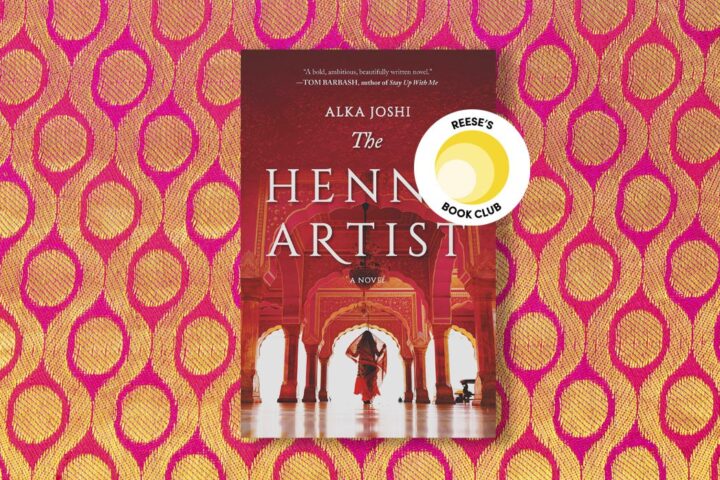The First Attempt
In my original ending to The Henna Artist, it’s Samir who is standing on the Jaipur railway platform, his eyes on Lakshmi as she stands looking out the window of the train. Radha and Malik are chatting in the compartment behind her.
When she sees Samir, Lakshmi feels that she cannot discount their years of friendship and everything he has done to help her achieve financial security. You can still feel the intense—yet fragile—connection between them.
Here is that original ending. After you’ve read it, decide for yourself which you prefer.
The Henna Artist
Epilogue
October 1956
The platforms of the Jaipur Railway Station were clogged with passengers, spiced peanut vendors, shoe shiners, beggars, and the odd dog sniffing for discarded morsels. Even after a train started moving, people continued to board, asking for a hand up, their luggage loaded by helpful passengers who themselves were hanging by handrails on both sides of their car. It was a wonder any trains managed to take off at all.
Our train was scheduled to depart in a few minutes. With the money from the sale of my house, I had splurged on a first-class compartment for all of us. Inside the cabin, Malik and Radha were chatting excitedly with Dr. Kumar, who had come down from Shimla to escort us all the way north, claiming he had business in Jaipur anyway. A restless Madho Singh shrieked from his cage, “Namaste, bonjour, welcome!” to the bewilderment of passersby.
I stood in the passage just outside our compartment, along the row of windows facing the platform, watching scrawny porters, swathed in several mufflers, lug bags on and off trains. Important-looking husbands in wool vests, trailed by wives and children, shouted at the baggage handlers to be careful. Families with first-class tickets walked to our part of the train. Most headed to second-class seats. Those who couldn’t afford porters were stuffing their mismatched carriers into the third- class cars, yelling at everyone to make room. The chai-wallas strolled up and down the platform, selling glasses of tea through the car windows. Keeping one eye on the departure schedules, men hurriedly consumed chappati and curried subjis in tiffins prepared by their wives, mothers, sisters, aunts and friends.
I thought back to the first time I came to Jaipur at the age of twenty—my first ride on a train. How exciting it had all been! The promise of a new life. Anxiety about whether it would all work out. Samir had had to assure me repeatedly that it would. And it had. I had come to this city with nothing but a skill for drawing and the lessons my Saas taught me. I had helped women fulfill their desires—whether in the pursuit of something or in the pursuit of its absence—so they could move on with their lives. Now, Jay Kumar was offering me a chance to reinvent myself, to use my knowledge to heal the old and young, poor, sick and infirm, in need of solace.
First Samir. Now Jay Kumar. Would my guide always be a man, I wondered. Yet, hadn’t women helped me, too? Kanta. Mrs. Patel. The Maharanis Indira and Latika. Mrs. Sharma. And even Parvati.
Jay Kumar’s voice shook me from my reverie. “Will you miss it?” He had left our compartment to stand behind me.
I shook my head. I wouldn’t miss Jaipur—every city had its charm—but would I miss Samir? I still thought about him, how companionably we had managed our business, the times we had laughed together, moments when our bond had felt true, strong. There were things I no longer admired about him, as I once had, but he had been a part of my life for so long that to quash those memories would have been like pretending that a third of my life didn’t exist.
I turned to Jay and smiled. “You didn’t have to come. We could have managed to make it to Shimla without you.”
His gray eyes studied my face. For the first time, he looked at me without shifting his gaze. “And take a chance that you might change your mind?” He lifted his chin to point to the platform. “Or have someone change it for you?”
I turned to the windows again. In the middle of the crowded platform Samir Singh stood still, a statue in an English suit, hands in his trouser pockets, watching me.
Jay lingered a while longer before squeezing my shoulder and returning to our compartment. I had never talked to Jay about Samir, but he was a sensitive man and I assumed his imagination, and his knowledge of Samir, had filled in the gaps. I did not know if the two remained friends.
For over a decade, Samir had loomed so large in my life. Without him, would I ever have left Agra? Or would I still be making sachets for the courtesans there? If he hadn’t introduced me to Parvati, would I ever have been invited to the Maharani’s Palace? Been served tea by royalty?
The shrill whistle of the train pierced my ears, announcing our departure. Slowly, the train began moving its heavy carcass. Its wheels of steel chugged and heaved forward. Last-minute passengers hurtled themselves and their cargo onto the cars. Chai-wallas collected empty glasses.
“Auntie-boss! Train is leaving!” Malik called from our compartment.
“Namaste! Bon Voyage! Goodbye!“ chirped Madho Singh.
Samir sprang into motion, jogging to my car, and reached for my hand. I clasped it through the open window. His fingers were warm. His grip was firm. He said something I couldn’t hear over the screech of the wheels. Then, he placed something in my palm, releasing my hand as the train picked up speed. I closed my fist around the object.
His eyes never left mine.
As the train gained speed and Samir became a blur, I pulled my hand inside, unfurling my fingers, and studied at the pearled “L” on the cover of the enameled pocket watch. I flipped open the false cover, mesmerized by the tiny Indian woman painting henna, carefully, patiently, one stroke at a time.
The End
In this version, as you can see, Lakshmi appears grateful, almost beholden to Samir, which is contradictory to the deeper self-awareness she ultimately gained as I continued to edit the novel. Lakshmi had emerged from her Jaipur experience a changed woman—a woman who needed to forgive herself, forgive her ex-husband and shift her focus to the healing skills she had cultivated and would continue to do so. I no longer felt Samir had any business being part of that equation.
What do you think?


